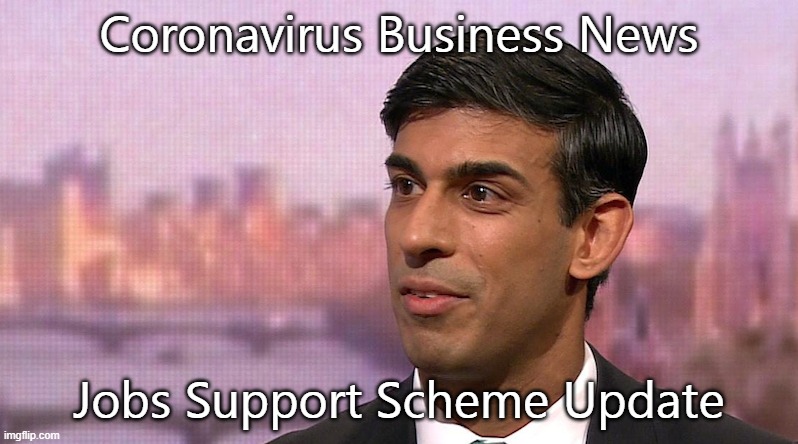
Four Key Updates
Rishi Sunak has revealed his eagerly anticipated package of major measures to combat the negative economic impact of the Coronavirus.
It was blindingly obvious that with the numbers of new SARS-CoV-2 cases rising significantly, plus winter fast approaching, the Chancellor’s plan to end employment subsidies (SEISS and CJRS) would have to be changed by extending or replacing them.
Mr Sunak based his new provisions on three fundamental principles:
- To support viable jobs
- Targeting firms that need help the most
- Opening up government help to all UK firms, whether or not they have claimed before
The Chancellor’s statement included four main areas of assistance:
- Plans for a jobs support scheme to replace furlough.
- Help for the self-employed,
- Help with the cost of business loans
- VAT cuts.
Implementation of the new schemes and changes to existing packages will commence on 1st November 2020.
-
Jobs Support Scheme
The main provisions of the scheme are:
- The government will subsidise the pay of employees who are working fewer than regular hours due to lower demand
- Workers must do at least one-third of their regular hours
- Employers will pay staff as standard for the hours they work
- The government and the employer will pay a third each for the hours they can’t work, which means someone working a third of their hours would receive 77% of their pay
- Grants will be capped at £697.92 per month
- All small and medium-sized businesses will be eligible for the scheme
- Larger companies will be eligible if their turnover has fallen during the crisis
- It will be open to employers across the UK even if they have not previously used the furlough scheme
- The scheme will run for six months starting in November and replaces the “furlough” scheme It means the government will pay a much-reduced percentage of someone’s wages when compared to the 80% at the start of the furlough policy
The scheme works on the basis that if an employee works reduced hours the employer will pay for that as usual. However, the balance of normal pay will be shared 50:50 between the employer and the Treasury (up to the cap of £697.92 per month).
As an example, someone on £1,800 a month working 33% hours, would get £600 normal pay plus £400 extra from their employer and £400 from the government.
Also, businesses will not be able to issue redundancy notices to employees on the Job Support Scheme, and there will be restrictions on dividends to shareholders.
-
Support for the self-employed
The key details are:
- Extensions to grants for the self-employed are on similar terms to the Jobs Support Scheme
- A grant will be available to those eligible for the Self Employment Income Support Scheme Grant
- The grant will cover three months’ worth of profits for the period from November to the end of January
- It will cover 20% of average monthly profits up to a total of £1,875
- A further grant is likely to be available to the self-employed to cover February 2021 to the end of April, depending on circumstances
-
Business loans
The extra areas of help being offered are:
- All Bounce Back Loans will be extended from six years to 10, cutting monthly repayments by 50%
- Around half of Coronavirus Business Interruption Loan Scheme lenders will also be able to extend the length of loans from the current maximum of six years to 10 years
- The Chancellor is also extending the deadline for the government’s coronavirus loan schemes to the end of November
- Businesses struggling can choose to make interest-only payments for six months, and those “in real trouble” can apply to suspend repayments altogether for six months
- The Chancellor also stated that businesses would not see their credit rating fall as a result of reduced or interest-only payments
-
VAT & Self-Assessment
There are three keys areas of help:
- The 15% emergency VAT cut for the tourism and hospitality industries will be extended from January 2021 to 31st March 2021

David Jones, Shrewsbury Accountant
- Businesses who deferred their VAT bills will be able to pay back their taxes in 11 smaller interest-free instalments
- Self-assessment income taxpayers will be given more time to pay. No details have yet been given but it is expected that individuals will be able to pay any outstanding tax owed over the 2021/22 tax year
Well there you have it, quite a list, but I’m sure that Rishi will be making a few further tweaks and concessions in the coming weeks. The announcements on Thursday have been supported by both the heads of the TUC and the CBI. But will they be enough; only time will tell.
If you would like more detailed information on some aspect of UK Tax, send me an e-mail and I’ll be pleased to advise further.

 David Jones is the Senior Partner and Founder of Morgan Jones & Company. Born in Liverpool and an Accountancy graduate of the University of Wolverhampton, David spent twenty years working for the Customs & Excise in London then Shrewsbury before starting his own business. David's depth of knowledge of the UK tax system and his ability to communicate this learning has seen Morgan Jones & Company grow into Shropshire's most respected Accountancy Practice.
David Jones is the Senior Partner and Founder of Morgan Jones & Company. Born in Liverpool and an Accountancy graduate of the University of Wolverhampton, David spent twenty years working for the Customs & Excise in London then Shrewsbury before starting his own business. David's depth of knowledge of the UK tax system and his ability to communicate this learning has seen Morgan Jones & Company grow into Shropshire's most respected Accountancy Practice.